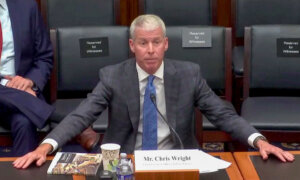WASHINGTON—Minority Leader Chuck Schumer (D-N.Y.) previewed a possible bill to constrain President Donald Trump’s newly formed advisory body, the Department of Government Efficiency (DOGE).
Days after The New York Times reported that DOGE had gained access to Treasury payment data through Treasury Secretary Scott Bessent, Schumer urged Bessent to end that access.
He said he and House Minority Leader Hakeem Jeffries (D-N.Y.) are working on legislation to shield the Treasury payment system from the tech billionaire Elon Musk-led executive-branch entity, should Bessent fail to impede DOGE.
“We must protect people’s Social Security payments, their Medicare payments, tax refunds, from any possible tampering by DOGE or any other unauthorized entities,” the Senate minority leader said on Feb. 3 in remarks on the Senate floor, warning that “an unelected shadow government is conducting a hostile takeover of the federal government.”
The Treasury Department’s Bureau of Fiscal Services disbursed a total of $5.4 trillion through 1.3 billion payments in fiscal year 2023—almost 88 percent of all federal payments.
At a Feb. 3 press conference, Schumer was joined by Sens. Ron Wyden (D-Ore.), Patty Murray (D-Wash.), Elizabeth Warren (D-Mass.), and Brian Schatz (D-Hawaii). They criticized DOGE and other moves by President Donald Trump and his team as the new administration continues to implement its agenda at a breakneck pace.
Warren told reporters that Musk and DOGE “now have full access to your personal and financial information that’s in the system.”
She alleged that the tech leader could abuse ethics and related U.S. laws if he decided to use government information or resources to enrich his own enterprises.
Trump addressed the concern during a Feb. 3 press conference, saying, “Where we think there’s a conflict [of interest] or there’s a problem, we won’t let him [Musk] go near it. But he has some very good ideas.”
Before his involvement in DOGE, the success of Musk’s companies saw him ranked as the world’s second-richest man.
Schatz alleged that DOGE was flouting congressional oversight over the funds.
At the press conference, the Democrats stated that political realities on the ground would constrain their opposition. In the same 2024 election that returned Trump to the presidency, the American people voted that Republican lawmakers maintain a thin majority in the House and reclaim the Senate, the senators said.
Schatz said he and his colleagues “don’t have extensive leverage” but still have tools that they may reveal in the future.
“We’re just not going to preview all of our parliamentary moves,” he told reporters.
Schatz on Feb. 3 announced that he would implement a blanket hold on State Department nominees in response to the administration’s announced reforms to the United States Agency for International Development (USAID). In the meantime, Secretary of State Marco Rubio is USAID’s acting director.
Weeks before Schatz’s announcement, Senate Democrats began to slow the confirmation of Trump’s Cabinet nominees.
Murray, who is vice chair of the powerful Senate Appropriations Committee, pointed out that the next deadline to avert a government shutdown—March 14—is a month away, providing some basis for negotiations between the parties.
“Between now and then, we have to have an agreement—bipartisan—that goes through Congress, that is passed by the House and by the Senate,” Murray said.
“The level of trust is at the lowest I have ever seen it here in Congress, in our ability to work together, find a compromise, and get it passed.”
DOGE operates as a renamed version of the U.S. Digital Service in the Executive Office of the President, thanks to a day-one executive order. The temporary organization will be dissolved on July 4, 2026, the 250th anniversary of the adoption of the Declaration of Independence by the Continental Congress.
DOGE announced on Feb. 3 that it ended 20 consulting contracts “for immediate savings of $26 million.”
During a Feb. 3 press conference, White House press secretary Karoline Leavitt outlined instances of what she characterized as waste, fraud, and abuse by USAID.
One was a $32,000 grant to pay for the production of a comic “featuring an LGBTQ+ hero to address social and mental health issues” in Peru, she said.
Leavitt said cutting such spending to save American taxpayers’ money is “exactly what Elon Musk has been tasked by President Trump to do.”














